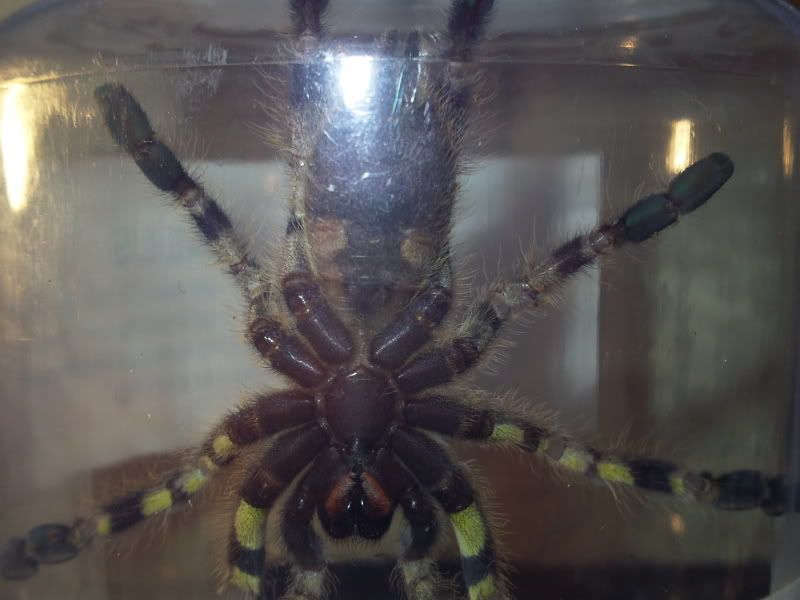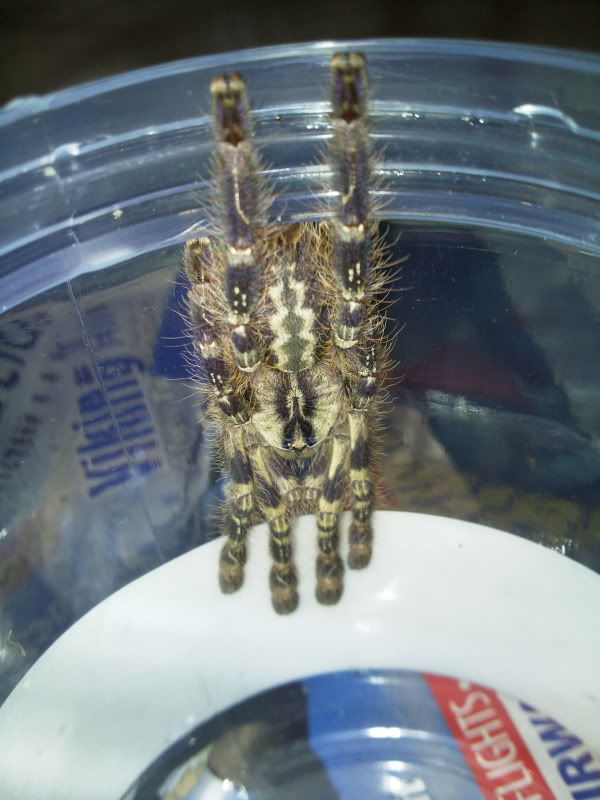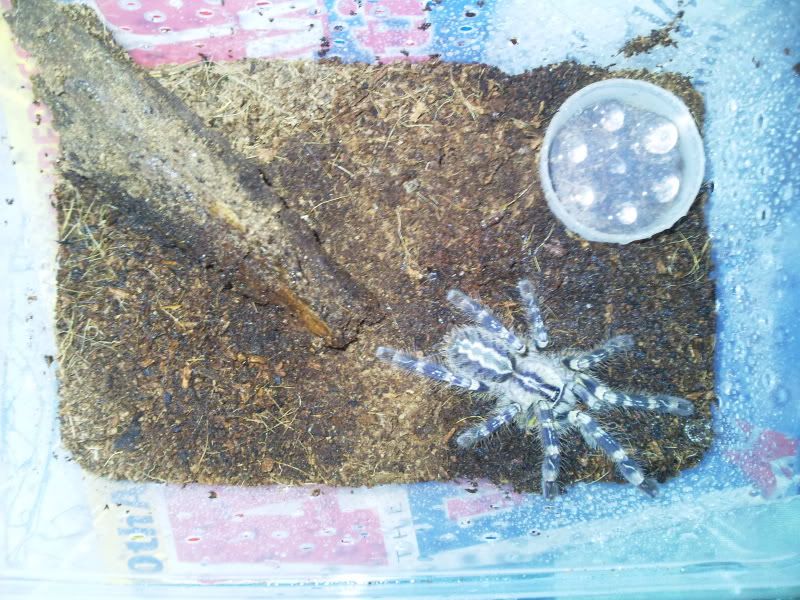infront of me i have my trusty pokie poster, as created by ray gabriel and richard gallon, i find this an extremely useful tool when trying to hazard a guess at identifying a pokie. can i say firstly i disagree with the suggestion of it being p.formosa, i say this because the T shown in the picture has bright yellow undersides to its legs, formosa does not, it has white undersides. using this technique we can narrow it down to either regalis, metallica, striata, fasciata or ornata. to me, in my opinion the colours and pattern of the T are a bit of a mis match. i would like to throw caution to the wind and suggest the possibility of a hybrid. as i said these comments are based on my opinion and light research that i have done, i say this to try and stop the starting of a debate before it begins
Announcement
Collapse
No announcement yet.
Have a new pokie!
Collapse
X
-
In what way? The ventral colouration on legs I & II match up with regalis, and so does the patterning on the carapace and around the eye structure. We can't give a full ID without a decent ventral shot. But the spider pictured certainly falls into a category that could be regalis.Originally posted by matthew spooner View Posti would bet everything i own on that not being regalis, it doesnt look anything like it
Definitely not metallica, the break in the yellowing of legs I & II is too large to be fasciata, the carapace does not meet the parameters ornata usually fall under, which leaves the two I mentioned a few posts back.Originally posted by matthew spooner View Postwe can narrow it down to either regalis, metallica, striata, fasciata or ornata.Last edited by Dan Kennard; 24-10-09, 10:42 PM.
Comment
-
Hi DanOriginally posted by DanHalen View PostI'm sorry, but there is an *awful* lot of misinformation on this thread. There is no way that spider is a formosa.
The leg markings and carapace suggest either a striata or a regalis. And the dark broad folio on the abdomen suggests an immature male.
Feed him once or twice a week, as overfeeding will reduce life span and possibly fertility. In regards to humdity, they neither require, nor like high humidity levels. Bone dry to slightly damp substrate, and an open water dish will be perfectly fine.
Where i am willing to accept it is hard to id from a photo and it could be one of two or three species, i would put my mortgage on it not being regalis, i own two and have posted photo's of both. You are right with the feeding as i said i feed mine 3 or 4 every 10 days or so.
I disagree on the humidity i have always kept mine at about 70%, good ventilation is the important thing, mine have never had a water dish they get a good spray three times a week and my oldest pocey is now 8 years old and very happy
Chris
South East Arachnid Show (SEAS) Sunday 31-1-16 Ashford international Hotel jct 9 M20
Why not make a weekend of it.
Comment
-
I've owned many regalis mate, and have bred them too. I'm not trying to take anything away from your experiences, but I've had an awful lot of poecilotheria over the years, and you know that pokie sticky featured on 4 forums, and referenced from many others? I'm the fella who wrote it.Originally posted by chris carter View PostHi Dan
Where i am willing to accept it is hard to id from a photo and it could be one of two or three species, i would put my mortgage on it not being regalis, i own two and have posted photo's of both. You are right with the feeding as i said i feed mine 3 or 4 every 10 days or so.
I disagree on the humidity i have always kept mine at about 70%, good ventilation is the important thing, mine have never had a water dish they get a good spray three times a week and my oldest pocey is now 8 years old and very happy
Chris
Now, I wouldn't call myself expert by any means, but I would definitely consider myself educated and experienced with the genus, and I really don't see how you can rule out regalis from two photographs. As I have mentioned several times now, the carapace and ventral markings on legs I & II narrow the options down to either regalis or striata (assuming we are not dealing with a hybrid - which is very unlikely). Considering at first glance, regalis and striata can appear identical, I don't see how you can say it's definitely one or the other without a better ventral picture.
Take into account that both species are sexually dimorphic, wherein males and females appear quite different to each other before reaching maturity, and then take lighting conditions, and makes of camera. You can't rule something out because the "overall" colouration doesn't appear right, when the ID key's you really need to take into account are quite obvious.
I can also cite a couple of example poecilotheria deaths resulting from too high a humidity level.
Comment
-
Hi DanOriginally posted by DanHalen View PostI've owned many regalis mate, and have bred them too. I'm not trying to take anything away from your experiences, but I've had an awful lot of poecilotheria over the years, and you know that pokie sticky featured on 4 forums, and referenced from many others? I'm the fella who wrote it.
Now, I wouldn't call myself expert by any means, but I would definitely consider myself educated and experienced with the genus, and I really don't see how you can rule out regalis from two photographs. As I have mentioned several times now, the carapace and ventral markings on legs I & II narrow the options down to either regalis or striata (assuming we are not dealing with a hybrid - which is very unlikely). Considering at first glance, regalis and striata can appear identical, I don't see how you can say it's definitely one or the other without a better ventral picture.
Take into account that both species are sexually dimorphic, wherein males and females appear quite different to each other before reaching maturity, and then take lighting conditions, and makes of camera. You can't rule something out because the "overall" colouration doesn't appear right, when the ID key's you really need to take into account are quite obvious.
I can also cite a couple of example poecilotheria deaths resulting from too high a humidity level.
Its the purple colouration that is causing the confusion. The simple way is to ask Ryan to let us know if the Tarantula has the broad white band on the underside of the abdomen. I would still be amazed if it was regalis it isn't only me doubting it all others on this thread doubt it also.
Poecilotheria are tolerant of dry conditions but several books on the subject also recomend 70-80% humidity, and this has always worked for for me, and i have always said to our members do what works for you as long as the spider is healthy. I have found that deaths due to High humidity are due to poor ventilation.
It is good that members of the forum question what they think is wrong,it is how we all learn new things and however long you are in the hobby there is always something new to learn.
Bottom line is whatever the species Ryan has got himself a bargain at £20.
Regards Chris
South East Arachnid Show (SEAS) Sunday 31-1-16 Ashford international Hotel jct 9 M20
Why not make a weekend of it.
Comment
-
Here's a regalis with some purple:Originally posted by chris carter View PostIts the purple colouration that is causing the confusion.

It's not uncommon at all to find regalis with a purple sheen. Dorsal colouration also isn't used as a taxonomic identification key in this species.
Yes, but just because it's published, doesn't mean it's right - I've seen it recommended that poecilotheria should be contatntly kept at those humidity levels, but I'm not sure where they get that information from. If you were to keep P. metallica at that level constantly, you'll have some problems - the region of India they come from averages only 50% humidity annually. Regalis & striata (whichever one the spider in question turns out to be) also come from more xeric regions.Originally posted by chris carter View PostPoecilotheria are tolerant of dry conditions but several books on the subject also recomend 70-80% humidity
Depends really. I've sold adult females for only £5 more, and I really think that could be a male.Originally posted by chris carter View PostBottom line is whatever the species Ryan has got himself a bargain at £20.
Comment
-
Dan Mate
Lifes too short! lets draw a line under this, i have dozens of books and they all contradict each other as i'm sure you have. like i said do what works for you i'm sure Ryan will decide whats best for him.
If ever i am fortunate enough to afford a metallica i will certainly come to you for advice because it is obvious you are very passionate and knowledgeable on the subject and i respect your views.
Chris
South East Arachnid Show (SEAS) Sunday 31-1-16 Ashford international Hotel jct 9 M20
Why not make a weekend of it.
Comment
-
I completely agree with you here Chris has i said earlier.The simple way is to ask Ryan to let us know if the Tarantula has the broad white band on the underside of the abdomen. I would still be amazed if it was regalis it isn't only me doubting it all others on this thread doubt it also.
Correct if i'm wrong Dan but the spider in question does have it's adult colouration and dosn't the male P regalis have the white band under the abdomen also........?Ruling out this spider as a regalis as it doesn't compare well to people's adult females is not good practice. As aforementioned, I personally believe this could be a young male - P. regalis are a sexually dimorphic species.
My Collection: - Support captive breeding

Comment
-
If it does transpire to be male, then no, it doesn't have it's adult colours yet. And yes, males do possess the cream band under the abdomen.Originally posted by Robert Martin View PostCorrect if i'm wrong Dan but the spider in question does have it's adult colouration and dosn't the male P regalis have the white band under the abdomen also........?
Comment
-
LOL, what a guessing game.
The white band will confirm whether its regalis or not but the carapace markings (hairpin pattern) suggests regalis or striata which along with fasciata are the ones that lean towards such large bright yellow marking under the legs.
Whatever it is you certainly have a lovely looking Pokie and its worth finding the functional cereal tub with cork bark retreat or a tall glass enclosure as a display tank.
Take note, these can be fast and those yellow warning markings are there for good reason
Enjoy!
Comment
-
Holy cow! this thread has been busy!! lol
Ok, rite lay down the guns everybody lol, it would be nice to know what species of spider it is that i own, but tbh im more happy the fact its a really nice spider and i got it nice and cheap! (btw, why is my G.rosea hanging upside down off the enclosure roof!! :S lol)
(btw, why is my G.rosea hanging upside down off the enclosure roof!! :S lol)
Anyway... heres some more pics of the pokie in question.
I cannot see a 'band' on its abdomen, just the usual 2 white patches.





Comment
-
I'll say this for you Dan you fight your corner, i still dont think it is regalis, but it doesn't exactly look like striata either and with the yellow underside they are the only candidates,apart from rufilata and it aint that.Originally posted by DanHalen View PostThat's a juvenile regalis.
The leg markings are spot on, and I can see the cream band developing. It'll take a few moults before it really stands out:

One of my members has PM me to say they have an identical Pockie he has had trouble identifying, Ryan is bringing his to our meeting on Wednesday and along with the other one we will get Ray hale to help us ID it. I am starting to wonder if someone has hybrid a regalis and striata and the resulting young are now appearing on the market as juveniles.
Looking forward to meeting you next year
Chris
South East Arachnid Show (SEAS) Sunday 31-1-16 Ashford international Hotel jct 9 M20
Why not make a weekend of it.
Comment
-
i hate it when someone asks for a bit of advice and it starts a debate, i am always ashamed when it involves me, i think we are all strong minded individuals who like to stand up for what we believe. like i said i am not brillianr with pokies but i would have xpected a regalis to have had a more prominent band and i have not seen one purple like that before, i know they are sexually dimorphic but every male i have seen has not been that colour. i think we can all agree to disagree. hopefully we can put the subject to rest after wednesday when ray sees the spicimens in the flesh. i do believe we could be dealing with a hybrid, as i mentioned near the beginning of the thread.THE SOUTH EAST ARACHNID SHOW, SUNDAY 29TH JANUARY, ASHFORD INTERNATIONAL HOTEL, JUNCTION 10 M20
My Collection: - Support captive breeding

Comment




Comment